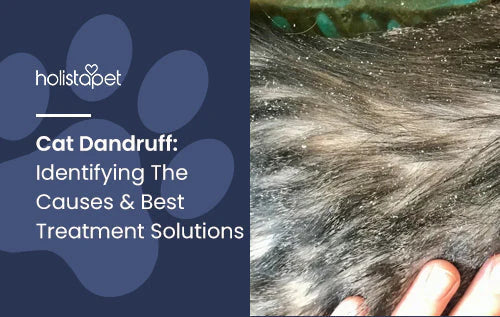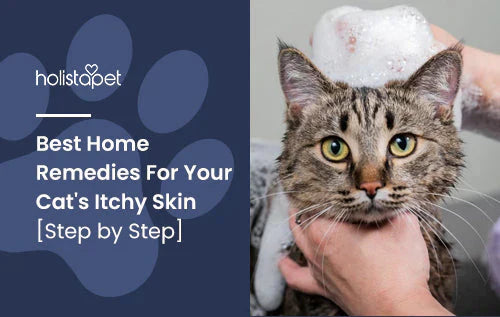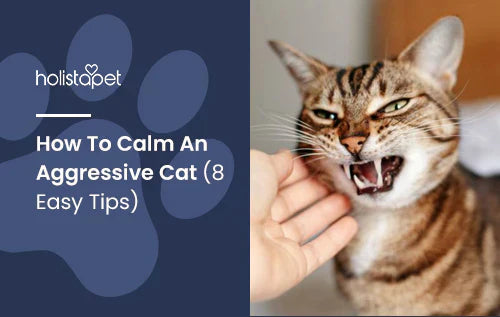Itching. Scratching. Biting. Little white flakes. That's cat dandruff! Just like people, our feline friends can get dry and irritated skin. And just like dandruff treatment people, dry conditions can lead to the skin coming off. You'll notice the flakes in their fur or maybe on their cat bed or tree. When you notice cat dandruff, the best thing to do is find the source of the problem.
Cats might get dandruff for many reasons, and almost all of them have solutions. How to treat cat dandruff at home? Let's take a closer look at how to spot and treat cat dandruff and how to help your kitty have healthy skin once again!
What is Cat Dandruff?
Dandruff is a common skin condition that causes dry, itchy, and flaky skin in cats. Like our own dandruff, dry skin is often the underlying cause. While it's not usually serious, dandruff can be uncomfortable for your kitty. It can also lead to further skin damage and infections.
Why Does My Cat Suddenly Have Dandruff?
Your cat's skin may suddenly be turning up on their fur (or your furniture) for several reasons. Not every case of dandruff is the same, and you might need to do some investigative work to get to the root cause of your cat dander, which is flakes.
Here are some common reasons for feline dandruff:
Improper Diet
Cats can get unhealthy skin if their diet doesn't contain enough omega-3 fatty acids. These nutrients are soothing and help cats with dry skin lesions or hotspots. Omega-3 fatty acids also give cats a fuller, shinier coat. Food allergies can also cause dandruff.

Dehydration
Cats can become dehydrated quite quickly. Cats are picky about water and often won't drink enough of it. Dehydration can lead to itchy, dry skin, another source of dandruff in cats.
Lack of Skin Moisture
Dandruff is a symptom of dry skin. Cats with flaky skin lacking moisture and natural oils often suffer from itchy skin and dandruff. The issue can worsen in hot summer when cats are overexposed to heat. Cats can get sunburns like humans, another source of damaged, flaky skin.
Obesity
Overweight cats can often have trouble cleaning certain parts of their body. Obese cats may be unable to reach their lower back when they clean. This can lead to dry, flaky skin at the base of their tail.
Parasites
A side effect of parasites can be flaky skin. Certain areas of a cat's skin can become rough and scaly, leading to dandruff. This issue of skin infection is more common in outdoor cats, who are exposed to parasites far more often. Cheyletiella mites are a parasite that some call "walking dandruff." Sometimes, you can see these mites crawling across your cat’s skin. Luckily, these mites are treatable with the help of a vet.
Shampoo
Cats can often clean themselves properly, but there's reason to bathe your cat once in a while. On the other hand, bathing too often can lead to dandruff. Cats' skin produces natural oils. If you wash your cat too often — even with dandruff shampoo — you can remove these protective oils. Any shampoo left on their skin will also irritate their skin, leading to more dandruff.

How to Know If Your Cat Has Dandruff - Symptoms
Dandruff is often more than just skin irritation or flakes. Here are some other signs to look out for:
- Constant itching: A cat with dandruff often has dry skin, which can lead to a lot of itching. If you see your cat consistently picking, biting, and itching its fur, that can often point to dandruff. Sometimes, dry skin and excessive grooming cause dandruff to form.
- Flaking skin: The most apparent sign of dandruff is flaky skin. If you part your cat's fur, you'll be able to see specks of white underneath. Cats with dark fur can sometimes have visible skin flakes caught in their fur.
- Irritated Patches: When you part your cat's fur, you might also see red, inflamed spots on its skin. This is from itching and licking, which leads to dandruff. These areas can also become infected if the skin breaks. You might also see scaly patches, such as dry pus or blood. Scabs often accompany flaky skin.
- Hair Loss: Dry skin can itch, making your cat scratch quite a bit. All of the biting, licking, and scratching can lead to hair loss in those areas, making it even easier for the cat to damage its exposed skin.
How to Get Rid of Cat Dandruff
Don't freak out if you see those pesky little flakes on your cat's fur! You can take steps to treat the condition and keep your cat's skin healthy.
More Liquids
Your cat may need more liquids in their diet! Switch to a water fountain, providing your feline friend with moving water. This will get most cats to drink more. You can also try switching your cat's diet to a 50/50 diet, replacing half of their dry food with wet food. Canned food contains over 70% water, meaning even the pickiest cats will get the moisture they need to regain healthy skin.

Healthier Diet
Please ensure the cat food you're providing them with is high quality and has proper nutrients, including omega-3 fatty acids, which they can get from salmon oil. If you suspect your cat may be allergic to their cat food, contact a vet to figure out what’s causing the reaction. The culprit is more than likely the carbohydrate "fillers" in the current brand you're feeding them. Find a brand with fewer carbs and high protein content.
More Brushing
Cats are exceptionally clean since they groom themselves. But if your cat has dandruff, that could be a sign that they are not caring for themselves properly. Some more giant cats might be unable to lick spots they can't reach. You can brush most cats at least twice a week with a slicker brush, but keep baths to a minimum. Too much shampoo and washing can leave them with even dryer skin.
Cleaner Environment
Cats are susceptible to their environment. Just like humans, poor air quality and chemicals can negatively affect them. While cats like warmer temperatures, humidity can contribute to unhealthy skin. Try installing a humidifier to provide your cat with more moisture. Consider an air purifier as well.
Stress
Stress can be another reason your cat has dandruff. Make sure your cat’s environment is calm and safe. Provide them with a cat tree or cat shelves, so they have their own space to claim. This will make them feel more confident, especially if there are other pets or children or new guests in the house. Try not to disrupt your cat's daily routine.
Treat Them For Pests
Ticks, fleas, parasites, mites. These are all pests that wreak havoc on your cat's skin. If you suspect your cat has any of these pests, you should book an appointment with their vet. Vets may prescribe antibiotics and steroids for severe, itchy, dry skin infections.
CBD Shampoo
CBD shampoo may soothe areas where your cat feels discomfort, making them less likely to scratch, bite, and excessively lick the area. Cannabidiol is a non-intoxicating phytocannabinoid that can improve some common ailments and pains. The compound interacts with the cannabinoid receptors in your cat's endocannabinoid system (ECS), including those found in their skin cells.
If your cat doesn't like bath time, you can also drop some CBD oil on your cat's food to give your cat a cannabinoid boost and provide some relief. We also offer CBD cat treats that even the pickiest felines can't resist.
Cat Dandruff Olive Oil Remedy
Your cat's dandruff could be caused by a lack of healthy fats in their diet. Add olive oil to your cat's food, like you'd drop in some CBD oil, to give your cat enough fat to keep their skin healthy. Olive oil has been known to be very beneficial to kitties with flaky skin.
You can also apply olive oil directly to your cat! Here are the steps for a DIY home treatment:
- Warm the oil up to room temperature so it can easily seep into your cat's skin.
- Cover your fingers with the warm olive oil and then massage it into your cat's fur and skin.
- Pay particularly close attention to areas where you notice the most dandruff.
- Leave it for about 15 minutes, and then wipe it off.
This treatment is daily or every three days, depending on how severe your cat's skin health dandruff problems are. Thanks to olive oil's abundance of antioxidants and Vitamin E, your cat's skin will become much healthier. Damaged fur can also benefit from the monounsaturated fatty acids in olive oil.
Preventing Cat Dandruff or How to Reduce Cat Dandruff
If you stay on top of their other health issues and grooming, your cat doesn't have to suffer from dandruff! Fortunately, there are things you can do to keep their skin from flaking in the first place.
Give Your Kitty the Full Spa Treatment
If your cat will allow it, try treating them to a full-body massage once in a while to treat dandruff. Massages exfoliate their skin and increase blood flow, which helps heal and prevent dandruff. Plus, you can apply some beneficial coconut or olive oil to soothe irritation and moisturize.
Turn Up the Humidity
If the air in your home isn't as dry as the Sahara desert, your cat's skin is less likely to be dry and flaky. Purchasing a humidifier to keep your environment humid can help your cat's skin retain moisture.
Keep them Pest-Free
Consider tick and flea treatments as a preventative measure, and keep your cat indoors to reduce exposure to these creepy crawlies!
Final Thoughts - Cat Dandruff
Is your cat always itching? Do you notice white flakes on their fur? Your cat may have dandruff. Don't panic because there's a lot home remedies for cat dandruff! This is quite common in kitties and can be easily fixed once you figure out what's causing the issue. Your cat could be dehydrated. Or maybe they have a sunburn. Once you figure out the source of their dandruff, many simple solutions will get your cat's dandruff under control.
Besides riding your cat from dandruff, there are many other helpful home remedies for cats. However, when pet problems arise, checking with your vet for advice and guidance is always a good idea.



 CBD Oil for Cats - Fast Acting
CBD Oil for Cats - Fast Acting
 CBD Cat Treats - Easy Dose
CBD Cat Treats - Easy Dose
 CBD Calming Chews for Cats - Highly Rated
CBD Calming Chews for Cats - Highly Rated
 CBG Oil for Dogs and Cats - Loved by Thousands
CBG Oil for Dogs and Cats - Loved by Thousands





Leave a comment
All comments are moderated before being published.
This site is protected by hCaptcha and the hCaptcha Privacy Policy and Terms of Service apply.